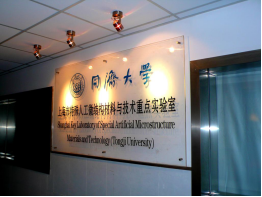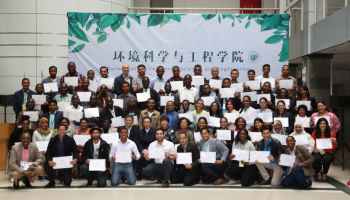1) Shanghai Key Laboratory for Development and Application of Metal Functional Materials
Established in 1995, Shanghai Key Laboratory for Development and Application of Metal Functional Materials is currently run jointly by Tongji University and Shanghai Iron and Steel Research Institute since 2002 under the support of Shanghai Science and Technology Committee. The Laboratory is composed of two campuses: the Research Campus and the Pilot Test campus. The former is located in the Department of Inorganic Materials, School of Material Science and Engineering of Tongji University. The latter, known also as Shanghai Iron and Steel Research Institute, has now been merged by Baosteel Group, one of the world’s biggest steelmakers. Led by Shanghai Science and Technology Commission, the Laboratory provides process composition design, inspection, test analysis and basic application research for the research, development and application of various metal functional materials.
In recent years, the Laboratory has applied for over 40 invention patents and authorized at least 18. Of nearly 30 research projects, some were funded by the central government, such as National Basic Research Program of China (973 Program), State High-Tech Development Plan (863 Program) and the 12th Five Year Plan, one of which has won the Second Prize of Scientific and Technological Award of the Ministry of Science and Technology, and two of which have won the title of State-level New Product. In addition, the Laboratory has established close cooperation with Shanghai Electric Group,Baosteel Group, local governments and the private sector in Shanghai and neighboring provinces. Remarkable progress has been made in tapping the synergy of the academia and the industry towards knowledge transfer and industrialization.
The research fields of the Laboratory include:
Ø iron-based bulk amorphous nanocrystalline dual-phase soft magnetic alloy
Ø new rare earth zinc-aluminum alloy
Ø metal microcrystalline fiber reinforced
Ø toughened magnesium alloy composite
Ø high-performance aluminum-silicon alloy
Ø new metal composite prepared by spray forming process
Ø wave power generation material and device design
Ø material fatigue performance research
2) Shanghai Key Laboratory of Tuberculosis
The Shanghai Key Laboratory of Tuberculosis was established in December 2004 by Shanghai Pulmonary Hospital, an affiliate of Tongji University. Its predecessor was Tuberculosis Basic Laboratory of Shanghai PulmonaryHospital,which dates back to 2001. The Laboratory consists of the Tuberculosis Basic Laboratory, the Tuberculosis Research Laboratory, and the Mycobacterium Laboratory, covering the basic, clinical and laboratory aspects of tuberculosis research.
The Laboratory is well equipped with the basic instruments and equipment required for tuberculosis bacteriology and molecular biology research (such as the biosafety cabinet, the high-speed freezing centrifuge, the ultra-low temperature refrigerator, the gel image analyzer, the PCR amplification instrument, etc.). It also has Gen-Probe, the world's most advanced device for tuberculosis gene diagnosis and strain identification, a mycobacterium rapid culture and drug sensitivity detector, and Pyrosequencing, a system for pyrosequencing.
In addition, the Laboratory has a bank of mycobacterium strains which contains a large number of clinical isolates of mycobacterium tuberculosis and non-mycobacterium tuberculosis and related background information.
At present, the Laboratory conducts research in the following areas:
Ø new methods for rapid diagnosis of tuberculosis
Ø new schemes for the treatment of tuberculosis
Ø pathogenic mechanism of interaction between tuberculosis pathogenic bacteria and hosts
Ø drug resistance mechanism of tuberculosis pathogenic bacteria
Ø screening of new anti-tuberculosis drugs and research on mechanism of action.
Among the laboratory researchers, 24 have senior professional titles and 3 have intermediate professional titles. Among them, there are 3 doctoral supervisors and 2 master supervisors. 17 researchers have a master's or doctoral degree.
3) Shanghai Key Laboratory of Special Artificial Microstructure Materials and Technology
As a key laboratory under the support of Project 211 and Project 985 of Tongji University, Shanghai Key Laboratory of Special Artificial Microstructure Materials and Technology was approved in November 2007 and officially launched in 2010. In close cooperation with Shanghai Institute of Space Technology, the Laboratory responds to national demands by seeking the international frontier of technology. Through the new technology of the preparation of artificial microstructure materials, we can effectively harness the characteristics of wave transmission.The synergy of basic research and applied research has enabled the Laboratory to create new materials, technologies and devices, which provides key components and technologies for major scientific projects such as synchrotron radiation light source, ultra violet lithography, information technology, new materials, new energy, energy conservation and emission reduction, environmental protection and other industries. Leading the development of disciplines, the Laboratory has become an internationally influential platform for microstructure materials and technology innovation and a training base for high-level talents.
The Laboratory conducts research in the following fields:
Ø Artificial Microstructure materials and devices of visible and infrared radiation;
Ø microwave information Artificial Microstructure materials and devices;
Ø X-ray Artificial Microstructure materials and special optical components;
Ø design and Simulation of Artificial Microstructure materials.
Building on some leading disciplines of Tongji University, the Laboratory has built a research team excelling in cohesion, innovation and research excellence. Having accomplished some state-level research and industrial projects, the team achieved a number of innovations, many of which, once industrialized, will translate into progress in energy conservation, new energy utilization, environmental protection, pollution control and other fields. Therefore, the research of this Laboratory is highly relevant to national economy, social development and national security, giving rise to some emerging industries thanks to the advancement of science and technology.

For more information please visit https://ammt.tongji.edu.cn/ (in Chinese).
4) Shanghai Key Laboratory of Signal Transduction and Disease Research
The Shanghai Key Laboratory of Signal Transduction and Disease Research was set up in August 2007 and officially approved in September 2009. On November 15, 2011, it was officially certified by Shanghai Municipal Science and Technology Commission. The laboratory is supported by Tongji University through the School of Life Science and Technology and the School of Medicine.
In the field of translational medicine, the Laboratoryexplores the role of signal transduction in the occurrence of Alzheimer's disease, the formation and metastasis of tumors, and the formation, maintenance and directional differentiation of pluripotent stem cells. Meanwhile, itactively taps the drug resources of traditional Chinese medicine (TCM) in China by identifying effective components of TCM through screening. Bioinformatics technology is leveraged in constructing relevant cell signal transduction networks, predicting and discovering new drug targets, thus promoting the transformation of results found in the signal transduction of major diseases.
The Laboratory serves the development of China's national economy through interdisciplinary research and innovation, and actively undertake national and local scientific research projects. So far, the research team has accomplished scores of research projects of all levels, including National Basic Research Program of China (973 Program), State High-Tech Development Plan (863 Program), key national science and technology projects and general projects of the National Natural Science Funds. Over 70 SCI-indexed papers have been published by team members of the Laboratory. Over the past two years, several key young researchers have received funding from the National Nature Science Fund and the Shanghai Municipal Science and Technology Commission's Talent Project. One of them has received funding from the Fund's Outstanding Youth Science Fund and another one has received funding from the National Outstanding Youth Science Fund.
The laboratory has also spared no effort in postgraduate training. At present, there are 34 master’s students, 26 doctoral students and 6 postdocs. Altogether 11 master’s students, 13 doctoral students and 2 postdocs have already graduated from the Laboratory, a testimony that the Laboratory has contributed to talent development.
For more information please visit https://life.tongji.edu.cn/12626/list.htm (in Chinese).
5) Shanghai Key Laboratory of Vehicle Aerodynamics and Vehicle Thermal Management Systems
Built by Tongji University and supported by the Ministry of Education and the Shanghai Municipal Government, theShanghai Vehicle Wind TunnelCenter project is one of the first key technological and industrial projects of Shanghai. Shanghai Key Laboratory of Vehicle Aerodynamics and Vehicle Thermal Management Systems is mainly involved in experimental and basic research on vehicle aerodynamics, aeroacoustics and thermodynamics. It is now a world-class public platform offering technical service.
Since its inception in 2009, the Laboratory has been providing a growing number of experiments over the years. At present, the wind tunnel center provides 4,000 hours of experimental services for automakers every year, which greatly boosts the independent innovation of China's automobile industry. In addition, it also facilitates Shanghai in her efforts to attract the regional headquarters of international automakers.
The Laboratory has also accomplished various state-level research projects such as National Basic Research Program of China (973 Program) and National Natural Science Funds in the experiments of high-speed trains and clean energy vehicles. The research team has leveraged its unique advantages in the integration of experiments and data simulation to claim the international frontier of technology in the field of aerodynamics and aeroacoustics data simulation of vehicles.


For more information please visit http://vatlab.tongji.edu.cn/ (in Chinese).
6) Shanghai Key Laboratory of Chemical Assessment and Sustainability
Supported by the disciplines of chemistry and environment of Tongji University, Shanghai Key Laboratory of Chemical Assessment and Sustainability also benefits from the unique international advantage provided by the United Nations Environment Programme-Tongji Institute of Environment for Sustainable Development (IESD). With the mission of "controlling and reducing chemical hazards, ensuring environmental safety and human health, and promoting the sustainable development of the national economy", the Laboratory adheres to the guiding principles of developing applicable technology to serve the society through scientific research, the Laboratory provides technical support and policy recommendations for chemical risk prevention and control in China and the world.
The Laboratory currently conducts research in the four major fields: chemical analysis and monitoring, chemical migration and transformation, chemical risk assessment and chemical pollution control. A platform with eight core research teamshas been established, with members from IESD and faculty from disciplines of chemistry and environmental science of Tongji University.
| Size of regular staff | 45 |
| Winners of New Century Talent Program of MOE | 3 |
| Distinguished professors of Shanghai Oriental Scholars program | 2 |
| Winners ofPujiang Talent Program of Shanghai Science and Technology Commission | 5 |
| Professors and AssociateProfessors | 42 |
| Lecturers | 3 |
| Doctors of Philosophy | 57 |

For more information please visit https://caslab.tongji.edu.cn/ (in Chinese).
7) Shanghai Key Laboratory for Urban Renewal and Space Optimization Technology
Shanghai Key Laboratory for Urban Renewal and Space Optimization Technology was established by the School of Architecture and Urban Planning of Tongji University by capitalizing on the synergy of three flagship disciplines, namely, Architecture, Urban and Rural Planning, and Landscape Architecture, with a view to developing the capacity of independent innovation and contributing to the Shanghai initiative of building a center for science and innovation. It was one of the four projects of 2017 Shanghai Key Laboratory Program.
The Laboratory is currently headed by Prof. WU Jiang, Executive Vice President of Tongji University. The mission of the Laboratory is to explore the urban renewal mode and technical system of urban sustainable development in the era of stock development, to study the theory and method of urban spatial development with Chinese characteristics, and to provide an academic platform and innovation base for global urban research.